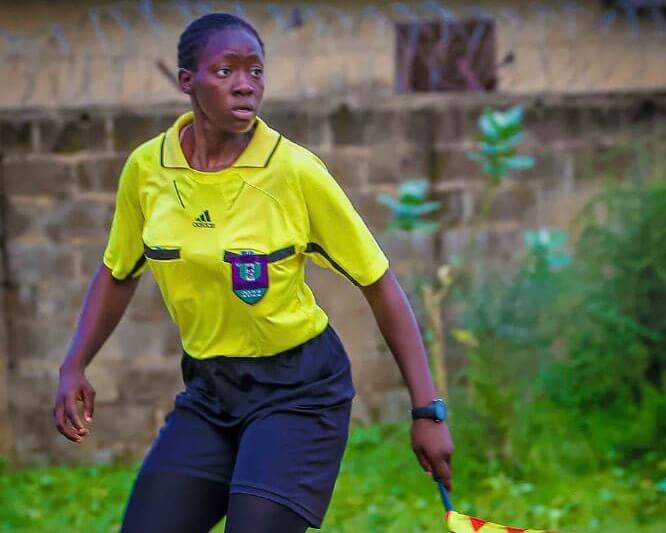Women’s involvement in football activities is growing but still largely unpopular. Without question, men’s football – unlike their female counterparts – enjoys a broader audience, sponsorship and support.
Only 2.5% of professional footballers in Europe are female, according to Zippia, a data company in the United States. However, demand for female sports talents is rising as opportunities in the field expand each year.
In January 2022, ABC Net, a media outlet in England, reported that Barcelona Femeni recorded an attendance of 91,648 in their UEFA home match against Wolfsburg, the most-watched match in female football.
UEFA also reported in 2022 that the women’s football fan base might grow from the current 144 million to 328 million in 10 years.
Yet, as female participation in sports continues to rise, their involvement in one of the most critical aspects of the game, “refereeing”, is still in its germinal phase.
Weebly Referee, a digital platform curating data about female referees in sports, says females make up only 4% of referees in football.
Hopes against the odds
Stephanie Frappart, a French woman, made history at the 2023 FIFA World Cup in Qatar, becoming the first woman to handle a FIFA men’s world cup game in a group G game involving Costa Rica and Germany.
Somewhere in Nsukka, a community in southern Nigeria’s Enugu State, Christabel James, a young female referee, wants to achieve high feats like Frappart.
Against all odds, she is keeping high hopes in professional refereeing. Before pursuing a career as a referee, she was a footballer. In 2019, she was part of the female football team of her school, the University of Nigeria, Nsukka, playing as a centre-back.
She trained for three hours with her teammates at Franco Pitch, a sports facility in the school, at least four days every week.
But she did not enjoy her mother’s support. Her mother was worried and tried to stop her from continuing the sport because she did not see football as a girl’s sport.
“It was a difficult time for me because I got punished each time I snuck out of the house to play football with guys,” the 21-year-old said.
Though she continued to practice and play despite the punishments she received, she considered taking on refereeing professionally, especially as she observed that only a few women officiate in football.
“We have just as few female referees as few female players. I want to be among the few and inspire others,” James said.
The switch
From then on, she started learning how to officiate at every match she played. She also read online articles and watched Youtube videos on the various refereeing rules.
Soon, she began to act as an assistant referee or linesman in games she was not playing.
In 2022, she became a Bauchi Council of Referees member in northern Nigeria’s Bauchi State. Now, she officiates as a linesman at football tournaments in the state.
“I enjoy holding and raising the flag because it always feels like I am holding my symbol of authority. The flag gives me this encouragement that I can become a professional referee in the future,” James said.
But the journey to becoming a professional referee has its challenges, especially with guys who try to discourage her. They say she lacks the physical strength required.
“Guys have told me several times that I will not go far in football or become a professional referee because I am a female. They always say I will get married and have to give up the sport,” James told Prime Progress.
But she is determined to continue. “I take their words as a challenge to keep improving and striving for perfection. I will not stop until I earn the FIFA badge,” James said.
Women's involvement in football is growing but remains less popular compared to men's football, which enjoys greater audience, sponsorship, and support. Only 2.5% of professional footballers in Europe are female, and women make up just 4% of referees. Despite this, demand for female sports talents is rising. In January 2022, Barcelona Femeni recorded an attendance of 91,648, the highest for a female football match. UEFA projects the women's football fan base to grow from 144 million to 328 million in ten years.
Stephanie Frappart made history as the first woman to officiate a men's FIFA World Cup game in 2023. Inspired by Frappart, Christabel James from Nigeria aims to excel as a professional referee despite societal challenges and initial lack of family support. Transitioning from a football player to an aspiring referee, she joined the Bauchi Council of Referees and now officiates at local tournaments. Determined to break barriers, James confronts stereotypes about women's physical capabilities in sports and seeks to earn the FIFA badge in the future.






